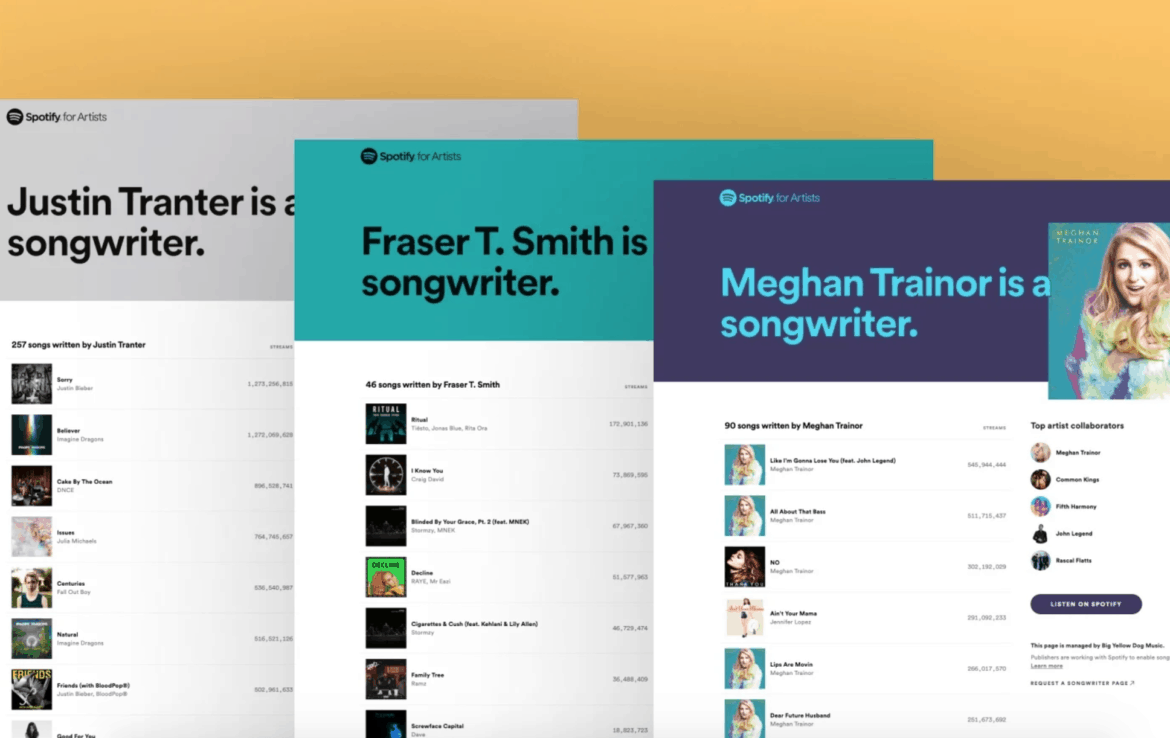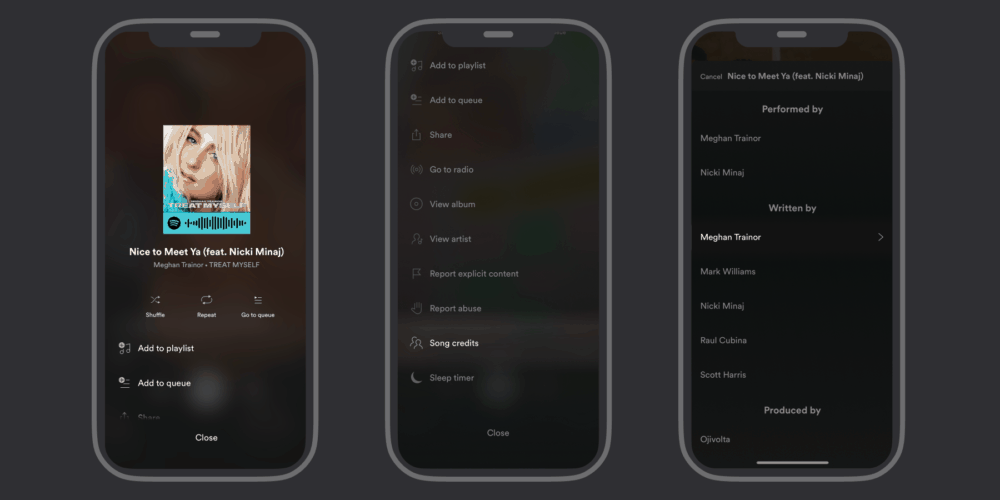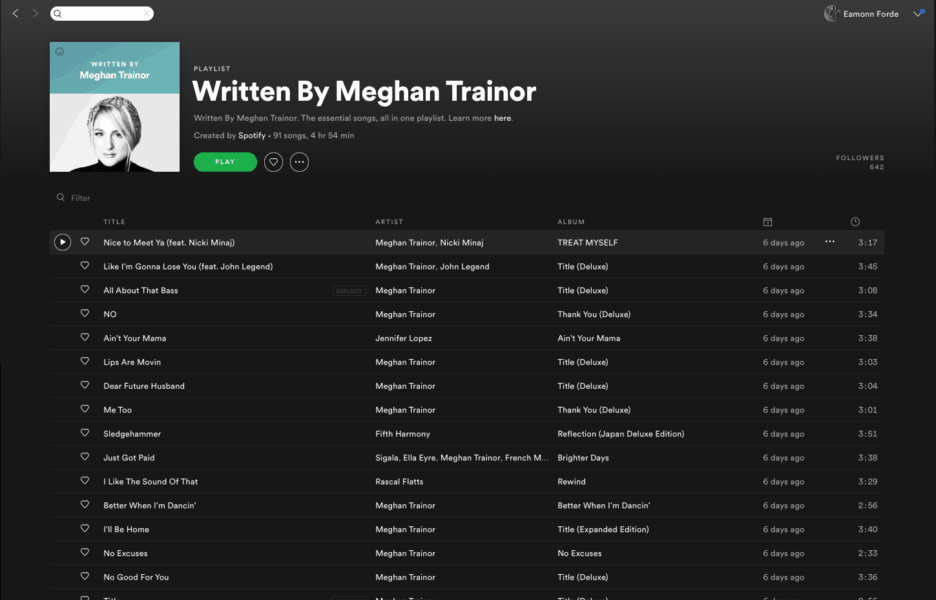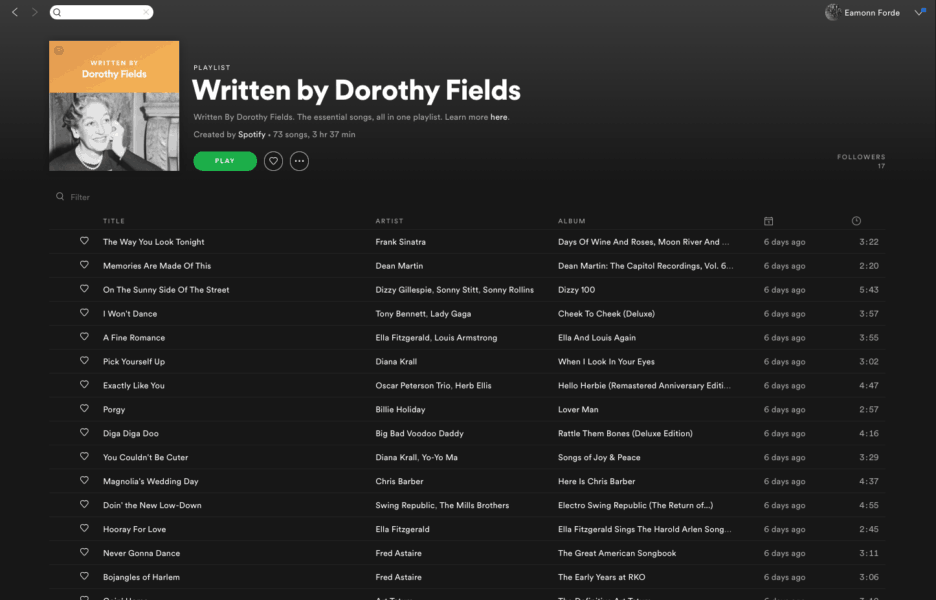Spotify, it is fair to say, has had something of a bumpy relationship with songwriters and publishers in recent years.
On the positive side, it added songwriter and producer credits to tracks two years ago, it launched Spotify Publishing Analytics in November 2018 to give publishers the same analytics tools as performers (although that remains in beta) and its Secret Genius initiative and awards are designed to shine a much-needed light on the writers of the biggest and best songs in the world.
On the negative side… well, where do we start? Last year saw Spotify butt heads with publishers over all manner of issues, not least its problematic launch in India (initially without Warner/Chappell on board and then finding itself mired in a protracted court case as a result) and its very public war of words with the National Music Publishers’ Associationover its opposition to the new royalty rates for publishers on on-demand streaming services as set by the Copyright Royalty Board (CRB).
For the publishing community, the regressions of the latter have far overshadowed the progressions of the former.
The arrival of Songwriter Pages (like Spotify Publishing Analytics, this is currently in beta) is a clear move by Spotify to play nice with writers and publishers at a time when olive branches are needed the most.
“The arrival of Songwriter Pages (like Spotify Publishing Analytics, this is currently in beta) is a clear move by Spotify to play nice with writers and publishers at a time when olive branches are needed the most.”
Key to this is that songwriters, just like artists, will have their own pages on Spotify and, just like artists, will theoretically be able to start to market and promote themselves directly on the platform, no longer having to accept being abandoned on a metadata back road and told to make do.
On its launch, Spotify cited a handful of writers (some of whom are also internationally famous performers, notably Missy Elliott, Mark Ronson and Meghan Trainor) who are part of the beta.
Each Written By… page has its own playlist and they all feature a title and image design that echoes the streaming service’s own This Is… playlists for recording artists. In certain cases, the playlists run to several hundred songs and will trigger many “I didn’t know they wrote THAT!” reactions. In the Song Credits when clicking on a track on the Spotify app, writers as they are onboarded will have their name as a clickable link that will lead to a list of songs they have written or co-written.
(This is not totally new as Spotify already has dedicated playlists for a handful of world-famous songwriters, notably the This Is Max Martin playlist (“Hits written and produced by Max Martin,” runs the tagline), This Is Chris Stapleton (“Also featuring songs written by Chris recorded for other artists”) and This Is Kenshi Yonezu. But this is the first time it has been done on such a mass level, particularly for writers whose songs might be global hits but they themselves are not household names.)
Some digging around also found writer pages for Lauv, Young Thug, MNEK, Meek Mill and Killer Mike (from Run The Jewels). But, in the main, the Written By… playlists tend to be build around writers who chose not to be performers or have recording careers that put them in the full glare of the spotlight.
A random selection of names includes Jennifer Decilveo, Nicolas Rebscher, Ilya Salmanzadeh, Lauren Christy, Jahaan Sweet, OZ and Ina Wroldsen. These are all currently active songwriters whose work underpins some of the biggest hits of the streaming age. This, in part, meets Spotify’s end goal here – which is to show that it is supporting not just new artists but also new writers. Spotify CEO and co-founder Daniel Ek said in 2018, “Our mission is to enable one million artists to live off their work.” While that quote was generally taken to mean performers, this move by Spotify is arguably an attempt to bend this back a little bit to also include writers.
(Writers not lucky enough to be included in the beta can apply to request a Songwriter Page by filling in their details online.)
That said, a huge missing part here is songwriters from earlier eras getting the same treatment so that they, their publishers or their estates can start to seize the opportunities here. The Spotify-curated playlists proclaiming Written By Rodgers & Hammerstein, Written By Goffin & King, Written By Holland-Dozier-Holland, Written By Chinnichap, Written By Greenwich& Barry, Written By Leiber & Stoller, Written By Whitfield & Strong, Written By Pomus & Shuman, Written By Gamble & Huff, Written By Mann & Weil, Written By Felice & Boudleaux Bryant and so on are (for now) conspicuous by their absence.
“A huge missing part here is songwriters from earlier eras getting the same treatment so that they, their publishers or their estates can start to seize the opportunities here.”
Extensive trawling did unearth two exceptions – Written By Dorothy Fields and Written By Billy Strayhorn – so there is a slow broadening out happening. Given how streaming is reconfiguring catalogue marketing, the hope is that the wait for all the names above (and more) to appear with their own pages and playlists is not too far off.
The hard sell from Spotify seems to be initially on a B2B level. “Labels, publishers, music supervisors, and artists at all levels of the industry tell us that they’re constantly scouring Spotify song credits,” it says on its blog post about the new features.
Of course, this is wonderful and any features that forefront the songwriter cannot be bad. It will help with sync deals, spark ideas for collaborations and generally push writers closer together. Yet if that’s all it is – a streaming music networking hub where the songwriter credits are buried in a series of links rather than placed front and centre – what we are really looking at here is a glorified LinkedIn.
It’s giving Songwriter Pages not just a consumer-facing push but also a consumer-centric relevance that could really change the temperature here.
“It’s giving Songwriter Pages not just a consumer-facing push but also a consumer-centric relevance that could really change the temperature here.”
Larry Mestel of Primary Wave has often jibed that quote-unquote traditional music publishers are not working in marketing, they are just working in licensing. “There’s a big distinction between synchronization – which is licensing – and real marketing,” he told Billboard last year. Songwriter Pages should, ideally, be the catalyst for a new type of writer-centric marketing.
As it stands, it is limited in terms of both the writers on board but also what they can do once they are on there. The hope is that this is just the first stage and not the end destination. Opening it up to all writers is critical: of course, not every writer will want to use the tools, but that should be their choice. Equally, taking Spotify Publishing Analytics out of beta is essential so the two features can move in lockstep. And putting profile pages together for the great songwriters of the past (not just the songwriters of the Spotify era) is paramount.
In the streaming age, the artists and the labels have dominated marketing in partnership with the DSPs. That is arguably down to the fact that this was just following on from the way things were always done: labels invested heavily in recording artists and performers and so they carried the bulk of the marketing responsibility (and cost).
Now, however, publishers and writers (both old and new) have more tools at their disposal (and more need to push their earnings from mechanicals, even with an increase in the CRB rates), so they should be able to also put their shoulder to the wheel. In doing so, they can redefine what music marketing is and, more importantly, where it originates from.
“Publishers and writers (both old and new) have more tools at their disposal (and more need to push their earnings from mechanicals, even with an increase in the CRB rates), so they should be able to also put their shoulder to the wheel.”
There is a sense that we are on the cusp of a writer-centric change. Rather than having to wait to be anointed a Secret Genius, writers can now roll up their sleeves and start to really market themselves in the streaming world.



